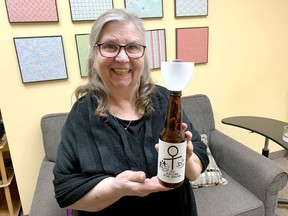Michelle Schryer has experienced sorrow, sadness, joy and elation during her time as executive director of the Chatham-Kent Sexual Assault Crisis Centre.

Michelle Schryer has experienced sorrow, sadness, joy and elation during her time as executive director of the Chatham-Kent Sexual Assault Crisis Centre.
Advertisement 2
Article content
After more than three decades of fighting for gender equality and protection for victims of sexual assault and harassment, Schryer will officially retire later this month.
Article content
“I’ve had the opportunity to be involved in really amazing work with really amazing activists and advocates and survivors,” she said.
Schryer, who was hired Oct. 1, 1990, said there are two things happening at the center.
“There are wonderful folks on the front line who are doing direct support and advocacy for victims and survivors of sexual violence,” she said.
While she has connected with many survivors during the decades, Schryer said her role has focused on a broader scope of work.
This has included CKSACC being involved in high-profile inquests including the death of former Chatham Sears employee Theresa Vince, who was killed by her supervisor on June 2, 1996 following months of workplace harassment that had been reported to her employer.
Advertisement 3
Article content
The center also played a role in the inquest into the Nov. 12, 2005 death of Lori Dupont, a nurse who was killed in Windsor by a doctor with whom she had worked but ended an intimate relationship.
These inquests brought about some positive changes such as the creation of sexual harassment awareness week and amendments to the Occupational Health and Safety Act. But, Schryer said there isn’t a need for more inquests, but rather the need to act on the many recommendations that already have come out of numerous previous inquests.
The CKSACC also has played a role in legislative victories such as Bill C-72: An Act to Amend the Criminal Code to address the issue of intoxication as a defense in sexual assault cases passed by the Legislature of Canada in June 1995.
Advertisement 4
Article content
Before the bill passed, the center launched a petition calling for parliamentary action that collected more than 3,000 signatures.
Schryer recalls a rally at the Chatham courthouse and a candle-light march attended by more than 120 people carrying candles in beer bottles with the labels stating: “No excuse for abuse.”
However, Schryer is still angry an Ontario court ruling in 2018 has allowed people accused of sexual assault to use excessive intoxication as a defense, after it was deeming the federal law was unconstitutional.
“It was such a hard victory, but such a wonderful victory, but to see us losing that is awful,” she said.
Schryer said in her experience, “I find that people feel if a young woman, a girl, has been drinking. . . then she’s blamed for her victimization.”
Advertisement 5
Article content
She added drunkenness is still used to exonerate and excuse that behavior if it’s regarding males, but females are still blamed.
“We don’t do that for drunk driving.”
When the Supreme Court of Canada struck down the Rape Shield Law in 1991, protecting the sexual history of sexual assault complainants, after it was found unconstitutional, the CKSACC found a way to take action.
The CKSACC was among sexual assault centers dealing with lawyers seeking access to confidential records of the women they served through subpoenas.
“We never once gave up a file, because we were subpoenaed,” Schryer said. “We always fought it, legally, in the courts.”
While this proved costly for the CKSACC, Schryer said she was told by “wonderful feminist lawyers,” who were pleading equality issues in the Supreme Court that more than once they cited the Chatham-Kent center in their arguments.
Advertisement 6
Article content
In 1999, an amendment to Bill C-46 regarding the production of records in sexual offense proceedings was upheld in a unanimous decision by the Supreme Court of Canada.
“I feel proud about that, because we did contribute to equality,” Schryer said.
Looking back on 33 years with the center, she said, “When someone walks through the door, it is really, really painful to see what they’re going through.”
But, she added she also gets to see them get through to the other side where they are walking through the door with dignity.
“I think that’s rewarding to all of us.”
CKSACC board chair Andrea Dickinson said the board is grateful to Schryer for her “strong commitment and contributions working toward a more just society, one in which gendered violence has been eliminated, and where everyone is valued and respected.”
Advertisement 7
Article content
Dickinson added Schryer has represented the CKSACC consistently with “courage and integrity at local, provincial and national levels, and has brought pride to the center through her participation on panels at international events.
“Her considerable efforts have contributed, in very real ways, to the advancement of gender equality, including legislative reform.”
While Schryer will remain active in the fight for gender equality, she will be doing it outside of the CKSACC.
“There’s time for a new, fresh vision, a new fresh energy,” she said.
Schryer believes she was put in place to do the work for which her skillset was suited.
“Seeing something wrong and trying to do something about it.”
She is glad Linda Soulliere is stepping into the executive director’s role.
Citing Soulliere’s administrative savvy in writing proposals and grant applications, Schryer said, “I feel very excited for the future of the crisis center, because I really feel Linda is the person to be here at this point in time.”
Article content